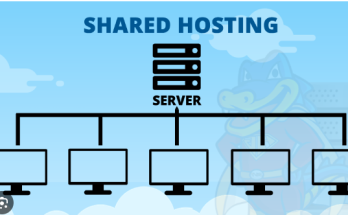Introduction (Approx. 200 words)
- Begin by introducing the concept of web hosting and its significance for website owners.
- Define shared web hosting and its basic principles.
- Highlight the importance of choosing the right hosting type for the success of a website.
- Provide an overview of what readers can expect from the article.
What is Shared Web Hosting? (Approx. 300 words)
- Explain the concept of shared web hosting in-depth, emphasizing how it works and its fundamental characteristics.
- Discuss how multiple websites share resources on a single server.
- Outline the typical features and limitations of shared hosting plans.
Advantages of Shared Web Hosting (Approx. 700 words)
- Cost-effectiveness: Highlight how shared hosting is budget-friendly, making it an ideal option for beginners or small businesses.
- Ease of Use: Discuss the user-friendly interface and simple setup process for shared hosting.
- Maintenance and Technical Aspects: Explain how the hosting provider handles server management and updates, freeing users from technical tasks.
- Scalability: Discuss the potential to upgrade plans or add resources as the website grows.
- Customer Support: Emphasize the importance of reliable customer support provided by shared hosting services.
Drawbacks of Shared Web Hosting (Approx. 700 words)
- Performance Issues: Discuss how sharing resources can lead to slower loading times and performance issues, especially during peak traffic periods.
- Security Concerns: Address the potential security risks associated with sharing a server, such as vulnerability to attacks targeting other sites on the same server.
- Limited Resources: Discuss the constraints of shared resources, such as bandwidth limitations and restricted server capabilities.
- Lack of Customization: Explain how shared hosting may limit customization options compared to other hosting types.
Is Shared Web Hosting Suitable for Your Website? (Approx. 400 words)
- Considerations for Choosing Shared Hosting: Provide guidance on factors to consider before opting for shared hosting, such as website size, traffic expectations, and resource needs.
- Target Audience: Discuss which individuals or businesses are best suited for shared hosting.
- Alternatives and Upgrading: Briefly touch upon other hosting options for readers considering alternatives or future upgrades.
Conclusion (Approx. 200 words)
- Summarize the key points discussed in the article.
- Reiterate the advantages and disadvantages of shared hosting.
- Encourage readers to weigh their options and make an informed decision based on their specific website needs.
Is Shared Web Hosting a Good Choice for Your Website?
1. Understanding Shared Web Hosting
Shared web hosting is a popular option where multiple websites share resources on a single server. Here’s why it might be a good fit:
2. Cost-Effectiveness
For beginners or small businesses, shared hosting offers an economical solution. With costs divided among users, it’s affordable compared to dedicated hosting.
3. Ease of Setup
The setup process is usually user-friendly, with providers offering intuitive control panels and one-click installations for various website platforms, making it ideal for those new to web hosting.
4. Maintenance and Support
Hosting providers handle server maintenance and technical issues, saving users from managing complex server tasks. Reliable support is often available, ensuring smoother operations.
5. Scalability and Resources
While resources are shared, most plans offer scalable options to accommodate growth. However, high traffic or resource-intensive websites might face limitations.
6. Security Concerns
Since resources are shared, security vulnerabilities in one website can potentially affect others. However, reputable hosts implement robust security measures to mitigate risks.
7. Performance Considerations
Shared hosting can suffer from performance issues during high traffic periods, impacting site speed. However, advancements in server technology have minimized these concerns.
8. Impact on SEO
Server performance can influence SEO rankings. While shared hosting might affect load times, optimizing other factors can help mitigate these effects.
9. Migration and Upgradability
As your site grows, you might outgrow shared hosting. Providers usually offer seamless migration paths to VPS or dedicated hosting for enhanced resources.
10. Customer Reviews and Recommendations
Researching and considering user reviews and recommendations for different hosting providers can provide valuable insights before making a decision.
Conclusion:
Shared web hosting offers an accessible starting point for many websites, especially those with moderate traffic and budget constraints. However, it’s crucial to weigh its benefits against potential limitations to determine if it aligns with your website’s current and future needs.
Introduction to Shared Web Hosting (Approx. 150 words)
Shared web hosting is a cost-effective solution where multiple websites share resources on a single server. This setup is managed by hosting providers, making it an attractive option for individuals and small businesses seeking an affordable online presence.
Pros of Shared Web Hosting (Approx. 500 words)
- Affordability: Shared hosting is budget-friendly, often offering low-cost plans for beginners or those with limited resources.
- Ease of Use: Providers handle server maintenance, making it hassle-free for users without technical expertise.
- Scalability: Some plans offer scalability options to upgrade resources as your website grows.
- Support: Many hosting companies provide customer support for troubleshooting and guidance.
Cons of Shared Web Hosting (Approx. 500 words)
- Performance Issues: Sharing resources can lead to slower loading times, especially if other websites experience high traffic.
- Security Concerns: Vulnerabilities on one site can potentially affect others on the same server, increasing security risks.
- Limited Resources: Restrictions on server resources might hinder your site’s performance, especially during traffic spikes.
- Customization Limitations: Limited access to server settings might restrict certain configurations or software installations.
Factors Influencing Shared Hosting’s Suitability (Approx. 500 words)
- Traffic Volume: Low to moderate traffic websites benefit more from shared hosting; high traffic sites might face performance issues.
- Budget Constraints: Ideal for startups or individuals with budget limitations.
- Technical Expertise: Suitable for beginners or those without technical skills; however, limited control might not suit advanced users.
- Type of Website: Basic blogs, portfolios, or small business sites can thrive on shared hosting; complex sites with specific needs might require more robust hosting solutions.
Tips for Choosing the Right Shared Hosting Provider (Approx. 350 words)
- Reliability: Research and compare uptime guarantees and server reliability among different providers.
- Customer Support: Look for providers offering responsive and knowledgeable customer support.
- Scalability Options: Check for upgrade options to accommodate growth if your website gains traction.
- Security Measures: Assess the provider’s security protocols and features to safeguard your website.
- Reviews and Reputation: Read reviews and gather insights from existing users to understand the provider’s performance and reliability.
Conclusion (Approx. 100 words)
In conclusion, shared web hosting offers an economical entry point for hosting websites, catering to specific needs and constraints. While it has limitations, it remains a popular choice for beginners and smaller-scale websites due to its affordability and ease of use.



